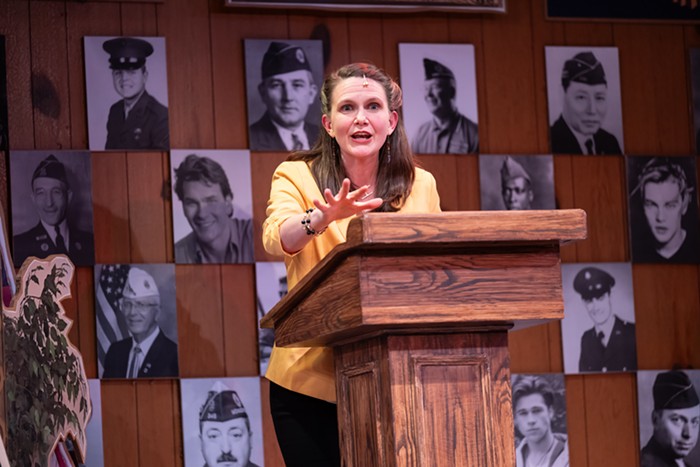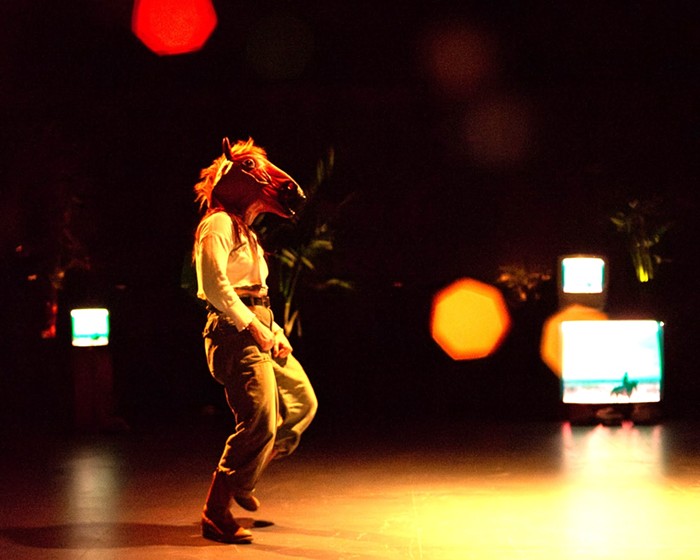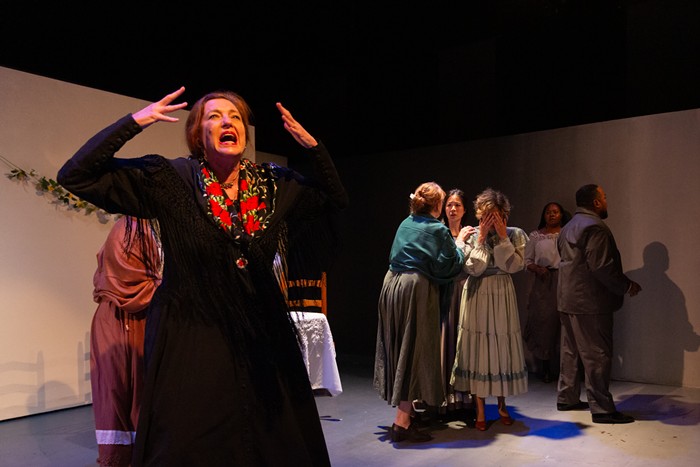Portland knows Holcombe Waller best as a musician, thanks to a distinctive voice and ubiquity on stages across town. But Waller is also a performance artist with several shows under his belt, including Into the Dark Unknown: The Hope Chest, co-commissioned by PICA and Seattle's On the Boards. This weekend, he debuts Surfacing, a show that examines the possibility of institutional social change, based on his interviews with New York drag performer Penny Arcade; physician Patch Adams; and the grandson of the founder of an anarchist-communist theater troupe.
MERCURY: Portland knows you best as a vocalist—can you speak about your background in theater and performance art?
HOLCOMBE WALLER: There's no short answer... I studied video installation in college, as an art major. Was never really into theater. But when I moved to Portland in 2005 to try to make a full-time go of being a singer/songwriter, my friend Wade McCollum cast me in his musical, One. I was his friend, Grover. I was suddenly onstage with all these total acting pros. And I loved it. I really loved the technical side, and all the time spent honing that interaction between the pieces. After the show ended, I wound up studying with Scott Kelman, whose technique is still taught here in town by Melanya Helene over at the Brooklyn Bay theater space. Scott, sadly, died a few years ago. His technique blew my mind—it was like an acid trip, without the acid. Around that time, my boyfriend was the founder of Sissyboy, and I took an interest (and occasional parts) in their multimedia spectacle. I decided I wanted to take all of these ingredients, but make my own show—drawing on musical theater, pulling from cabaret and drag camp, incorporating video design, but doing something entirely alien to all of these forms. The result was Mihael Sagalovesky and the Tragic Torments of Patti Heart Townes, a work that sort of earned me inclusion in the Time-Based Art Festival in 2007 and a subsequent PICA/On the Boards co-commission for Into the Dark Unknown: The Hope Chest. The rest is history.
In Surfacing, why did you choose to focus on the people you did?
I was in New York and had been working for about a year on a show called Surfacing based on this post-Apocalyptic sci-fi allegory I'd written—the fading emphasis on love and empathy in our busy lives, blah blah blah. I was totally hating my story, for obvious reasons: Love as a topic is pretty broad. My friend Penny Arcade took me to see [Living Theatre founder] Judith Malina's new play... which imagined these Old Testament rebels against Moses as proto-anarchist communists. Judith founded the Living Theatre, which [holds] a "beautiful, peaceful, nonviolent anarchist communist revolution" as part of its mission. After the show, we went upstairs to Judith's apartment—she's in her 80s—and gathered around her bed were these people: Patch Adams, Judith's grandson, Penny. A portrait of Dorothy Day was on the wall. I just decided, hell, this situation is a wayyy better show than what I'm writing. And it nails the point, in a way that's relevant to the world and not in some fantasy way. So in Surfacing, I kind of retell, and to a large degree, reimagine stories from and about these people. It's like a window into a certain world that I think is really worth celebrating, decorating, mythologizing. It's still got a lot of fantasy in it, but it's "based on true stories," as they say.
How does the content of your show address the idea that the world doesn't have to be the way it is?
In terms of the state of the world, I mean things have just gotten to be quite insane, obviously. And it will take a collective realization on a mass scale for things to change. And this change will only come from personal responsibility and participation. It will not come from the state, from the market... Change will come when each and every one of us take responsibility for ourselves and our collective selves, and really communities and smaller bodies do this work, not the big institutions. And this is exactly what all of the characters in the show have been saying—for 10, 20, 50 years. In detail, and with great prescience and forethought. So their stories captivated me. They are the past that is the inevitable future.
How does the content of your show address the possibility of social change?
HW: In terms of the state of the world, I mean things have just gotten to be quite insane, obviously. And it will take a collective realization on a mass scale for things to change. And this change will only come from personal responsibility and participation. It will not come from the state, from the market... Change will come when each and every one of us take responsibility for ourselves and our collective selves, and really communities and smaller bodies do this work, not the big institutions. And this is exactly what all of the characters in the show have been saying—for 10, 20, 50 years. In detail, and with great prescience and forethought. So their stories captivated me. They are the past that is the inevitable future.
Your work has an interesting sense of humor to it—you embrace a certain over-the-top quality, but it doesn't detract from the emotional core of what you're doing.
HW: Well, I think the reason I totally laugh at myself and make fun of myself onstage is actually that I take myself totally seriously. It's a bit of a paradox, but I don't think anything truly worth doing is worth being pretentious about. That's life. Beauty is born and then it falls apart, gets old, and dies. Humility is a must. None of us can really be so important, and that's the first key to trying to do important things. Also, the world of performing arts is incredibly pretentious. There are good reasons. And at the same time, all those reasons are total shit! Maybe I'm a closet Taoist.
Has the Occupy Wall Street movement influenced the show?
HW: It has totally affected the show... I've decided to incorporate Occupy imagery directly, particularly with respect to Dorothy Day, because essentially her work interpreting the Catholic Psalms and Scriptures results in a nonviolent anarchist philosophy that is amazingly intertwined with the Occupy ideas. And I think this fact might just blow a lot of people's minds. I actually, personally, think the Occupy movement is a kind of spiritual awakening. It's unfortunate that you have to rip people off, take their homes, make their families sick, and take away all their work for them to wake up—but you know, whatever it takes! I have a hard time, like, getting out of bed sometimes. So there's no accounting for the power of humanity to be totally lazy!
Will you be revisiting this work at all in the future? Is this weekend the only chance to see it in Portland?
I do hope it will return someday, but it won't be for a longtime, if ever. The show is specifically designed to tour, and I'm working my butt off trying to find opportunities and funding for it to do just that. Anywhere and everywhere. And I'm writing a "companion performance," in the sense that it's also an hour long and shares the same performer and technical footprint, in the hopes that the two shows can tour as a two-act evening or in alternating nights. So maybe when I premiere Wayfinders, which is the working title of that show, I'll premiere it as the second act of the combined evening. God knows where this money's gonna come from!!!



















